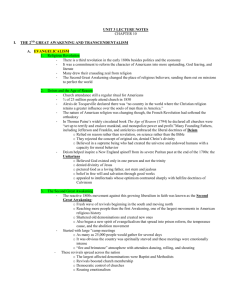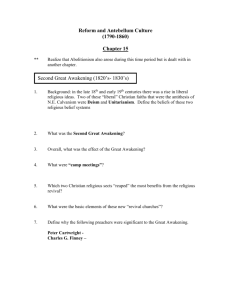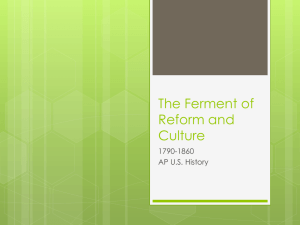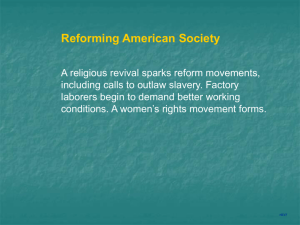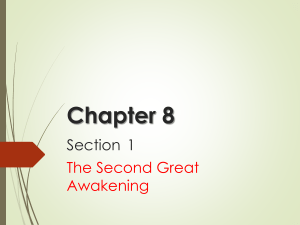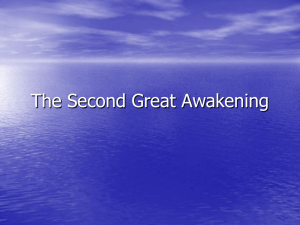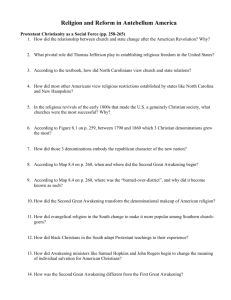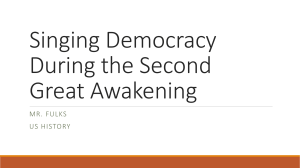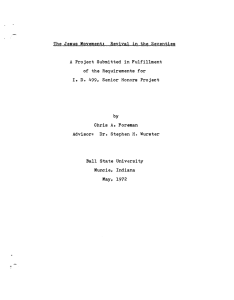The Second Great Awakening - West Morris Central High School
advertisement
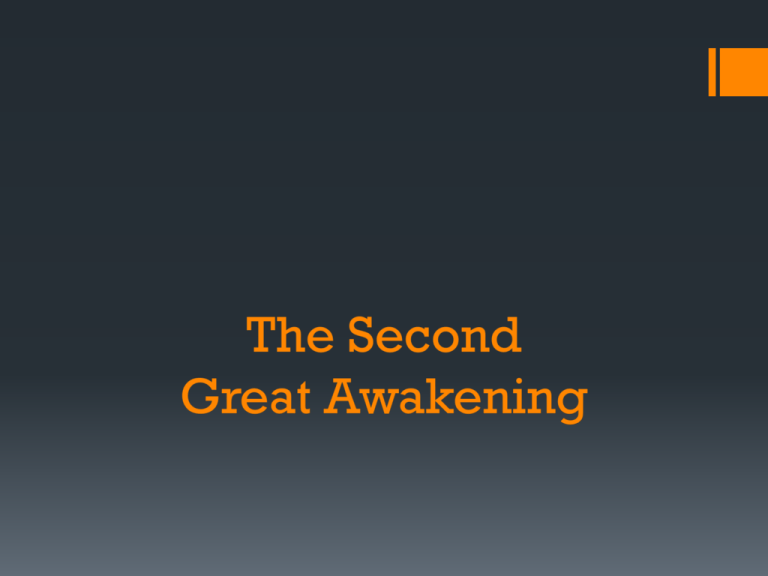
The Second Great Awakening Unit 8, Journal #1 What purpose does religion serve? Provide specific examples…If you yourself are religious, give us a personal example/story. Please keep responses appropriate and respectful. Remember: American society is beginning to change…and fast. What are some things that have been changing thus far? Westward expansion Sectionalism vs. Nationalism Jacksonians- power of the “common man” Rise of abolition…due to? …What else? The Second Great Awakening A religious, evangelical and revival movement peaking in the 1820s. New Christian sects emerge, others grow in number. 4 Key Aspects of Evangelicalism: 1. The need for personal conversion 2. High regard for biblical authority 3. Emphasis on the death and resurrection of Jesus Christ 4. Actively expressing and sharing the gospel What allowed this movement to begin? Secularism replaces formal religion by the end of the 18th century Definition: a system of political or social philosophy that rejects all forms of religious faith and worship. Government > Devotion to God. BUT, out of the changing society, many Americans seek a stable force – return to religion! Why? What is the driving force to want to return to religion? Second Great Awakening: Background Religion becomes much more democratic. ANYONE could participate, regardless of status. Shift from predestination to free will. Sense of personal morality increases. PEOPLE CAN IMPROVE THEMSELVES!!! Though God is still the ultimate authority, you are in charge of your own destiny. Revivals begin in Kentucky and Tennessee and moves rapidly out west – why here?! Camp Meetings Camp meetings were a crucial part of this revival movement. Church gathering, outdoors, with a stage and a crowd in front of it. People gathered by the thousands to listen to a circuit rider preach the gospel. People sought to establish a personal and emotional connection with God. Many conversions occur at these camp meetings. Revivalism flourishes: 1800: 1 in 15 belonged to a church 1850: 1 in 6 belonged to a church 1839, Methodist Camp Meeting “The power increased during the whole meeting. … Triumphing, … weeping, people falling, the voice of joy and sorrow mingling, prayer, praise, and shouting, shouting, shouting filled the groves around.” – William Thatcher, participant, 1804. Charles Finney, “Stewardship” When Charles Finney preached, his listeners shrieked, moaned, and fainted. The most famous preacher of his era. Inspired emotional religious faith. The “father of modern revivalism” Please read and answer questions regarding the sermon Finney gives. Unit 8, Journal #2 How can a push towards personal responsibility lead to change? When/How has this occurred in your lifetime? TRANSCENDENTALISM Outside Rules: Beauty in nature Pride Truth found in personal emotions We are small in the grand scheme of the nation If we are to take on a religious and emotional shift, what is likely to follow? Growth of REFORM Second Great Awakening: Personal duty to God, to uphold His word and the morals associated with the faith. Transcendentalism: KEEP IN MIND! Industrial Growth Increasing Migration and Immigration New Means of Communication
